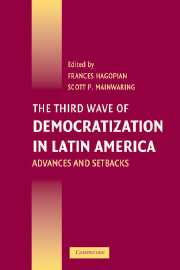Book contents
- Frontmatter
- Contents
- List of Figures
- List of Tables
- List of contributors
- Acknowledgments
- Introduction: The Third Wave of Democratization in Latin America
- 1 Latin American Democratization since 1978: Democratic Transitions, Breakdowns, and Erosions
- PART I THREE DEMOCRATIC GIANTS WITH AUTHORITARIAN PASTS: ARGENTINA, BRAZIL, AND MEXICO
- PART II UNEXPECTED DEMOCRACIES IN UNLIKELY COUNTRIES: BOLIVIA, EL SALVADOR, AND GUATEMALA
- 5 Bolivia's Democracy at the Crossroads
- 6 Challenges to Political Democracy in El Salvador
- 7 Democracy on Ice: The Multiple Challenges of Guatemala's Peace Process
- PART III DEMOCRATIC EROSIONS IN THE THIRD WAVE: COLOMBIA, PERU, AND VENEZUELA
- PART IV Conclusions
- References
- Index
7 - Democracy on Ice: The Multiple Challenges of Guatemala's Peace Process
Published online by Cambridge University Press: 05 September 2012
- Frontmatter
- Contents
- List of Figures
- List of Tables
- List of contributors
- Acknowledgments
- Introduction: The Third Wave of Democratization in Latin America
- 1 Latin American Democratization since 1978: Democratic Transitions, Breakdowns, and Erosions
- PART I THREE DEMOCRATIC GIANTS WITH AUTHORITARIAN PASTS: ARGENTINA, BRAZIL, AND MEXICO
- PART II UNEXPECTED DEMOCRACIES IN UNLIKELY COUNTRIES: BOLIVIA, EL SALVADOR, AND GUATEMALA
- 5 Bolivia's Democracy at the Crossroads
- 6 Challenges to Political Democracy in El Salvador
- 7 Democracy on Ice: The Multiple Challenges of Guatemala's Peace Process
- PART III DEMOCRATIC EROSIONS IN THE THIRD WAVE: COLOMBIA, PERU, AND VENEZUELA
- PART IV Conclusions
- References
- Index
Summary
This chapter focuses on Guatemala, a country that has experienced a breathtaking shift from decades of coups, repressive military regimes, and protracted civil war to the establishment of electoral democracy, which began in 1986 and culminated with the signing of the final peace accords in 1996. Regular, free, and fair elections are today the rule, and former guerrilla leaders hold elected office at both the local and the national level. Moreover, indigenous groups have emerged from the shadows and are in the process of forging a new Mayan ethnic identity.
These changes in Guatemala represent a stunning advance in democracy in a country where few scholars would have predicted them. It is even more difficult to explain why they have occurred. This chapter will review those advances, but it will also highlight the several major challenges Guatemala must overcome if democracy is to deepen and the promises of the peace accords are to be fulfilled. The chapter argues that unless these challenges are met, not only will further progress be denied, but the chances for serious setbacks will increase.
ADVANCES IN GUATEMALAN DEMOCRACY
The striking advances that Guatemala has made in democracy since the mid-1980s stand in such bold relief largely because of the dismal state of affairs that had prevailed for much of the prior two centuries. In terms relative to the rest of Latin America, Guatemala is still far behind; it was ranked nineteen out of twenty countries (only Haiti ranked lower) in the Fitzgibbon-Johnson study of the opinions of Latin Americanist experts for the year 2000 (Kelly 2001), and Freedom House classifies Guatemala, notwithstanding fifteen years of regular free and fair elections, as only “partly free” (Piano and Puddington 2001).
- Type
- Chapter
- Information
- The Third Wave of Democratization in Latin AmericaAdvances and Setbacks, pp. 202 - 232Publisher: Cambridge University PressPrint publication year: 2005
- 8
- Cited by

